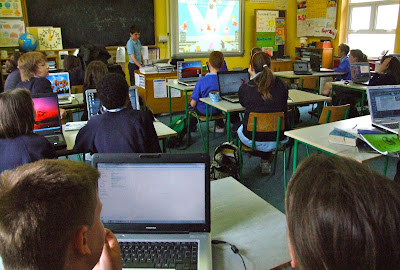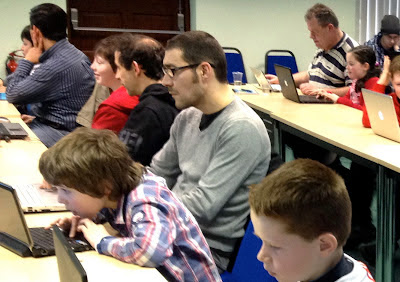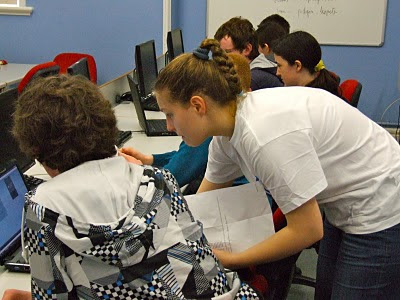Once that was finished, the participants digitised the little clay figurines using a camera to upload to their computer and later onto their 'Scratch' computer language applications. The clay models then becoming animated characters within their very own computer festive game or digital story!
My Writings (I hope!) reflect my Guiding Principles: -'Enjoy Life to the Utmost but not at other people's expense'-'Think Global, Act Local'-'Variety is the Spice of Life'-'Use Technology & Wisdom to Make the World A Better Place for All God's Creatures'-'Do Not Accept Injustice No Matter Where You Find It'-'Laughter is the Best Medicine'
Clay Modelling, Computer Coding & Holistic Education in Galway
Once that was finished, the participants digitised the little clay figurines using a camera to upload to their computer and later onto their 'Scratch' computer language applications. The clay models then becoming animated characters within their very own computer festive game or digital story!
Galway city Coderdojo Club Promotes Father and Son Bonding
Part of the rules of the club is that children younger than 12 must be accompanied by a parent or guardian. Furthermore, we recommend too that these adults should if possible not just sit around passively waiting for the classes to end but actively take part in the course.
The results of this policy have much better than we expected!
Galway City Coderdojo Goes From Strength to Strength
The club has 148 participants that come from as far away as Newport and Ballina in May, has a waiting list of c.30, and has already laid the foundations for two new clubs (Castlebar and Athenry).
Read previous article New Coder Dojo Hackers Club Reflects Galway’s Digital Vibrancy
New Coder Dojo Hackers Club Reflects Galway’s Digital Vibrancy
 |
| Early 1980s: DEC Galway had computer links to 10 second-level schools |
However as with the recent establishment of the Ballinfoile Mór Cumann na bhFear/Men's Shed, it is about Irish people recapturing the ability to use their hands and intellect to make things again rather than just be the passive recipients of items imported from overseas.
We are beginning to move away from being a nation of digital users to a nation of digital creators.
As Community/Education Outreach Officer at the Digital Enterprise Research Institute (DERI) at NUI Galway, I am part of this process of change which involves some very exciting initiatives.
DERI’s Caoilfhionn Lane will provide a workshop on ‘How to Build A Mobile App’ at 7pm on Tuesday February 28th in DERI. Open to the general public, the aim of this workshop is to show beginner or non-programmers how to create a simple phone app using Eclipse and the Android SDK. They would learn how to install the Android SDK and the Android Phone Emulator and explore a sample game, ’Lunar Landing’.
The event will allow visitors to play classic games such as Sonic the Hegehog, Donkey King, Pacman, Asteroids, Space Invaders and Super Frog on an array of vintage microcomputers & consoles (late 1970s-mid1990s) that include Atari, Sega Mega Drive, Playstation 1, Nintendo Gameboy, Amiga & Commodore 64.
Using Arcade Games To Inspire New Generation of Programmers & Innovators

What promises to be an exciting night of Retro Gaming will take place from 6pm until 8pm this Friday (Sept 23rd) in the National Computer and Communications Museum located in the Digital Enterprise Research Institute (DERI) at NUI Galway.
This event is being held as part of ‘National Culture Night’ and visitors will be able to enjoy playing video Arcade classics including Pacman, Asteroids and Space Invaders on renowned vintage consoles and computers such as Atari, Amiga and Sinclair ZX81.
The sights and sounds on offer will try to capture the essence of the early days of computer gaming of the 1970s and 1980 which made a major contribution in the overall development of digital sound and graphics.
But attendees will also be introduced to the software coding that constitutes the games. They will be allowed to actually input these computer programmes line by line, to experiment with the code and to make their own creative enhancements. This should give participants a better understanding of how digital technology actually works. For a key aim of this event is be part of a process of introducing young people in particular to the software infrastructure behind popular devices such as smart phones, sensors and laptops thus hopefully inspiring them to consider careers in computer science and engineering which are essential prerequisites in creating a sustainable knowledge-based innovative society that will help secure a niche for Ireland in an ever-changing world.
It must be remembered that a previous young generation enthusiastically took on similar challenges during the early days of computing and created many of the technologies that we use today. They became innovators and entrepreneurs combining youthful imagination, artistic skills with a scientific understanding.
When microcomputers such as Sinclairs, BBCs and Apple 11s were first introduced into Irish schools during the early nineteen eighties, children often had to write their own programmes as there were few affordable applications available. Sadly this ability to be taught how to make things in IT classes has been replaced in the intervening decades by a policy of only teaching pupils to use applications such as word-processing and databases. Whilst this is a laudable exercise, nevertheless we must re-educate our young people in the lost art of computer coding which should be considered a life skill that forms part of the national educational curriculum. Otherwise we will remain, what in literary parlance could be referred to, as a nation of readers rather than of writers.
Over the last year, DERI mentors have provided computer programming courses to primary and post-primary schools in Connacht. In partnership with the Galway Education Centre and other stakeholders, we intend to roll out courses in programming to as many schools as possible over the next year. We will also be promoting the setting up of an inter-schools’ students Computer Club and encouraging participants to draw inspiration from visits to Ireland’s only museum which highlights the important but oftentimes hidden role of Irish people, women and young people in the history of world communications.
We Need to Teach Our Children How to Programme!
 I have just completed teaching a pilot series of Scratch programming courses in primary schools in Galway and Mayo. I found this work, both on a professional and personal level, extremely fulfilling. For I believe that I am part of a process that is helping to provide skills to children that could help them and the nation secure a long-term future.
I have just completed teaching a pilot series of Scratch programming courses in primary schools in Galway and Mayo. I found this work, both on a professional and personal level, extremely fulfilling. For I believe that I am part of a process that is helping to provide skills to children that could help them and the nation secure a long-term future.This teaching complimented the pioneering work that my university Institute colleagues Laura Dragan and Pierre Ludwick were doing on C++ programming with second-level students.
Parent Support
Note: Most schools that we worked with understandably did not have enough computers to allow the ideal ratio of one/two participants per computer for the Scratch sessions. So we asked schools to write to parents requesting that their child could each week have use of the family laptop (should they have one) in the classroom for the course days.
This initiative was in most cases surprisingly successful.
Scratch is a wonderful programming language developed by the MIT Media Lab in the United States that makes it easy for users to create their own interactive stories, animations, games, music, art and to share these creations on the web.
It has a simple structure that is based around snapping together visual blocks of computer code that control sound, music and images. Hence it is ideally suited for children as it compliments the artistic elements of the primary school curriculum allowing users to bring their artistic skills into a new digital dimension to create computer games, animations and stories.
The kids I taught were infatuated with Scratch and took to it like ducks to water, creating the most amazing animations and interactive games.
Computer Programming Should be a Life Skill for All Children
However it is unbelievable to realise that, when the basis of government economic policy is to create a Knowledge Society, computer coding is not part of the Irish primary or post-primary educational curriculum. Instead schools can only offer the official primitive low-level and out-of-date courses based around teaching students how to use office application software such as word processing and spreadsheets.
It would be funny if it was not so serious to the future of the nation. Of course progressive principals and teachers do offer coding modules. But a few far-sighted individuals in a few schools is not enough. Programming should be a life skill taught to all children. Not providing it in mainstream education is a fundamental flaw that will seriously undermine the chances of building a Smart Economy, which we need if we are to take on the challenges of the 21st century, when the shift of economic power in the Global Village is moving inexorably towards eastern Asia.
Of course, the schools will need extra staffing and resources to allow this to happen which means extra state investment. This may seem illogical to some in an era of financial constraints and when educational budgets are been cut.
But we have no choice if we are want to secure a future for our people.
The new Minister for Education, Ruairi Quinn, seems to have a more open attitude towards educational reform than his predecessors. So I intend to organise a cross party delegation of experts to meet with him on this issue of programming in schools.
 Like Finland and other visionary countries, we need to invest and to exploit in a sustainable way our own natural resources (human as well as physical) that will allow us to create world class skill-sets and markets. In the case of Ireland, it could be renewable energies (wave and wind), organic agriculture and eco/heritage tourism.
Like Finland and other visionary countries, we need to invest and to exploit in a sustainable way our own natural resources (human as well as physical) that will allow us to create world class skill-sets and markets. In the case of Ireland, it could be renewable energies (wave and wind), organic agriculture and eco/heritage tourism.
Then there are the bio-medical and information technologies.
Building the Foundations of a Knowledge Economy in Ireland
Throughout the history of mankind, technology has defined our progress. Today Science and Technology research is more important than ever to the national interest. It is needed to attract in outside investment resulting in a growing demand for engineering and computer science graduates as leading IT companies from online gaming to social networking establish major operations in Ireland.
Already we have a number of important advantages. For instance, Ireland is second only to California's Silicon Valley as a world centre of influential technology companies (e.g. 7 of the top 10 Information Communications corporations such as Facebook, Google, IBM, Hewlett-Packard, Intel and Alcatel are located here). Many of these businesses have major R & D operations here.
Galway - An Irish Silicon Valley
I work in the state-funded Digital Enterprise Research Institute (DERI) at Galway University (NUI Galway) which is one of the world's leading international Web Science research institutes, particularly in the area of the Semantic Web. DERI's vision is to lay the foundations for a Semantic Galway Bay, a world class technological powerhouse of businesses, built around the institute’s scientific expertise. It is aiding in the creation of critical new jobs, products and services needed for transforming Ireland into a competitive knowledge economy. It could therefore become the equivalent of a Stanford University providing the brainpower to an Irish version of Silicon Valley.
But there is a dire shortage of computer science graduates in the country. One reason is that until the demise of the Celtic Tiger, there was a tendency amongst young people to pursue careers within the ‘safe’ sectors (legal, accountancy, property, banking and administration) rather than go for the more demanding areas such as in science, engineering, crafts and agriculture.
As with the heavy labour jobs, we imported people to undertake these creative professions as we started to quickly lose the ability to make things.
In the short term, schools can call on mentors from the third level sector (such as DERI), from the private sector through companies such as Medtronic who operate ambitious corporate social responsibility charters and from educational bodies such as the Galway Education Centre who coordinate partnership science support programmes.
Below is an article of mine on this subject that appeared recently in the Galway City Tribune newspaper:
A science institute at NUI Galway is helping to lay a key foundation stone in constructing Ireland’s future Smart Economy by introducing computer programming classes into Irish primary and post-primary schools.
“Volunteer mentors at the Digital Enterprise Research Institute (DERI), an internationally acclaimed centre of web science research, have just completed tutoring on a three month after-school pilot programming course at St. Mary’s College Galway city”, according to its Outreach Officer, Brendan Smith. “The institute is also providing similar courses to primary schools in counties Mayo and Galway. The young participants in our classes are enjoying the fact they are able for the first time to write their very own games and other programmes. They are becoming creators rather than just users of software. Whilst these activities are outside the Irish educational curriculum, nevertheless, we feel this type of learning is essential and must become mainstream if Ireland is to carve out for itself a sustainable technology niche that will hold onto existing internationally renowned software manufacturing enterprises, attract in even more global leaders in this sector as well as in fostering a self-perpetuating indigenous Irish corps of innovators, entrepreneurs, engineers and companies in such areas as ‘Cloud Technology’ and online ents gaming.
Our Young People Need to Learn how to Make Things
rather than just Use Things
“When microcomputers such as Sinclairs, BBCs and Apple 11s were first introduced into Irish schools during the nineteenth eighties, children had to write their own programmes as there were few affordable applications available. Sadly this ability to be taught how to make things in IT classes has
been replaced in the intervening decades by a policy of teaching pupils to use applications such as word-processing and databases. Whilst this is a laudable exercise, nevertheless we must re-educate our young people in the lost art of computer coding.
In literary parlance, we have become a nation of readers rather than of writers.
“We are very happy with the way that the primary and post primary students and teachers have responded to our introductory classes over the last few months. In partnership with the Galway Education Centre and other stakeholders, we intend to roll out courses in programming to twenty schools over the next year. We will also be promoting the setting up of an inter-schools’ Computer Students’ Club and encouraging participants to draw inspiration from visits to Ireland’s only Communications and Computer Museum that is based at DERI and co-organised with eGalway.”





























